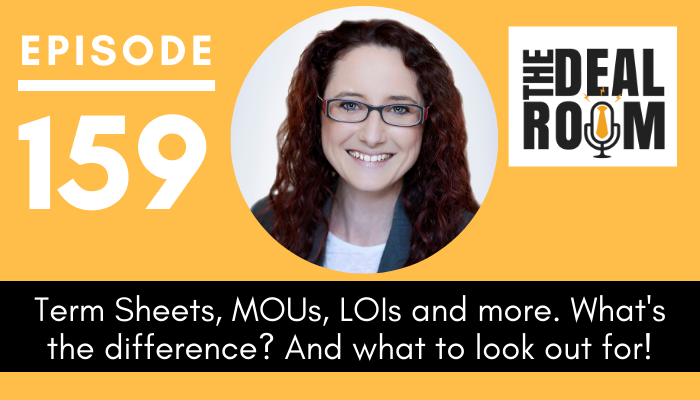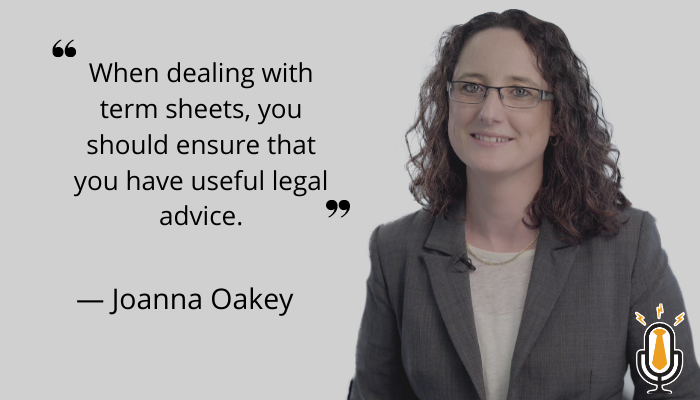
In this episode, we clear up some confusion around the commonly used “Term Sheet” and its many variations. If you have ever wondered what the difference is between an MOU, LOI, Term Sheet, NBIO or a Heads of Agreement, then listen in to this episode as we debunk some myths, clear up the confusion and dish out a couple of essential tips.
We are covering all of these and more!
- Term Sheet
- MOU (Memorandum of Understanding)
- NBIO (Non-Binding Indicative Offers)
- NBO (Non-Binding Offers)
- Indicative Offer
- LOI (Letter of Intent)
- Commercial Terms
- HOA (Heads of Agreement)

Episode Highlights:
- Different terminologies that are commonly used for term sheets
- Are term sheets binding?
- Ensure that you have adequate legal advice
- Quick recap and final takeaways
Listen to the episode here and leave us a review:
Transcript below!
Note: This has been automatically transcribed so will be full of errors! We are not providing it to you as a word-perfect version of the podcast but just as an easy way to provide you with a different way to be able to scan for information that might be relevant to you.
Joanna: Hi, it’s Joanna Oakey here and welcome back to The Deal Room podcast, a podcast proudly brought to you by our commercial legal practice, Aspect Legal. Now today is a really short episode where I just want to, in very high-level cover off something that has come across my desk a few times in the last few weeks. And so I wanted to clear up a bit of confusion. It’s what on earth is the difference between all of these names that we give to the document that documents the high-level commercial terms between the parties. So what terminology have I heard used there are so many different names, we can call them the commercial terms, a term sheet, MOUs and that means the memorandum of understanding, an LOI, that means a letter of intent, or an NBIO, which means a non-binding indicative offer.
So all of these words, and certainly I’ve probably heard more, and I can’t think of them right at this moment but these are all terminology to describe essentially the same thing and that is the high-level document that sits between the parties, the buyer and the seller, to set out the high-level commercial terms in relation to the deal that has been agreed. Now I’ll record another podcast, just giving you a snapshot of the timeline and where everything sits in the order. But just as a quick overview, generally these terms sheet as I’ll call it, but you might be calling it something else. These terms sheet generally records that general agreement between the parties in relation to the high-level terms and seats, then before due diligence quite often due diligence will happen after the term sheet, and then the contracts will be prepared in parallel. But timelines can be different depending on the transaction. Sometimes contracts won’t begin to be negotiated until after due diligence. And sometimes, you know if the timing is important, and in general circumstances will be starting the negotiation of the contract in parallel to due diligence being undertaken. But today, we’re just talking really just about these terms, sheet document.
So another question that I’m often asked is, terms sheets binding? And the answer to this is? Well, it depends. It depends on what the parties want. So generally speaking, term sheets aren’t binding, the general idea of them is that you will set out in them the prices that have been agreed between the parties, the parties themselves, what it is that’s being sold, so is it a business sale or a share sale, and then the structure of the deal. So that might mean that the purchase price is paid in various ways that might be sitting out earn-outs or the terms of deferred payments if there are deferred payments, you might include security, or you might leave discussions of security until the negotiation of the purchase contract. And one other thing that might be a consideration for inclusion in the terms sheet, particularly if you’re coming in from an acquirer perspective, the buyer perspective is whether or not you’re going to include an exclusivity period into the terms sheets.

Now, this is where elements might be taken to be binding. So if we, as a buyer, want to bind the seller into an exclusivity period, so that we can be assured that during the period that we’re spending money on getting due diligence done, we are protected, that the seller is not shopping the business around to another potential buyer, we can add an exclusivity period in and the exclusivity period might simply be the period of the due diligence, or it might be a longer period depending on what’s appropriate between the parties and in the transaction itself. And so that exclusivity period is generally a component of the terms sheet that is binding, whereas generally, other components of the term sheets are not binding other than perhaps the confidentiality provisions, but you’ll usually find that there’s a nondisclosure agreement that’s separate to the term sheet that has also been signed by the parties, which deals with a greater degree with confidentiality, but generally confidentiality is also another component of the term sheet that will be included. And that element will generally have a binding nature to it.
But other than that, generally, term sheets are not binding and in some instances, they might be but the reason that the rest of the term sheets in relation to the purchase and the price is not binding is that your sale contract contains so many extra details that won’t be included in these term sheets. So that is the warranties that go together with the business detail about conditions precedent and things that have to happen before entering into a binding contract itself within the contract, that this is far too much detail from the term sheet. And what you’re trying to do with the term sheet is keep it as simple as possible, but as detailed as it needs to be to protect where both of the parties are at in the transaction. So even though it’s a simple document, there are quite a few things to think about when you’re looking at using a term sheet. So just as a recap of the things that we’ve covered today, there are lots of different names for a term sheet, commercial terms, terms of the agreement, heads of agreement, MOU, LOI, NBIO, or just term sheet. But it really doesn’t matter what heading you use, the thing that matters is the way it is set out, and the allocation to the elements that will be binding and not binding from a legal perspective. And the second component is you need to be aware that even though these documents are short, there still is sometimes a bit of thought that needs to go into what should be in the documents. So this is the time that you should absolutely be ensuring that you have adequate legal advice to ensure that you have the right kind of term sheet that you’re using that is appropriate for the transaction when you sit in the transaction. So I hope that’s been a useful overview for you.
I know it’s been a short sharp on and if you’d like to talk more about the specifics of templates that you’re using it and you’re an advisor or a broker in this space, or indeed if you’d like advice if you’re a buyer or seller, then simply head over to our website at www.aspectlegal.com.au and click the free call button and you’ll be able to set up a time with one of our legal Eagles to discuss how we can assist you in working with your terms sheets document. Well, that’s it for this episode of The Deal Room podcast. Don’t forget to tune in next week as we continue our discussion in tips and tricks, all related to business sales and acquisitions. Thanks for tuning in. You’ve been listening to Joanna Oakey and The Deal Room podcast. See you next time.
Our Business Sales and Growth by Acquisitions Services
Aspect Legal has a number of great services that help businesses prepare for a sale or acquisition to help them prepare in advance and to get transaction ready. And we’ve also got a range of services to help guide businesses through the sale and acquisition process.
We work with clients both big and small and have different types of services depending on size and complexity. We provide a free consultation to discuss your proposed sale or acquisition – so see our show notes on how to book a time to speak with us, or head over to our website at Aspectlegal.com.au
Disclaimer: The material contained on this website is provided for general information purposes only and does not constitute legal advice. You should not depend upon any information appearing on this website without seeking legal advice. We do not guarantee that the contents of this website will be accurate, complete or up-to-date. Liability limited by a scheme approved under Professional Standards Legislation














